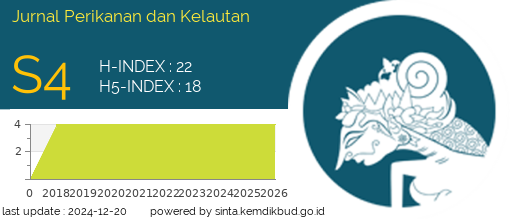Potential of Vanname Shrimp Skin Astanxanthin Hydrolyzate as Alpha Glucosidase Enzyme Inhibitor
DOI:
https://doi.org/10.31258/Keywords:
Astaxanthin, Antioxidants, Alpha GlucosidaseAbstract
The purpose of the study was to analyze hydrolysate astaxanthin as an inhibitor of the enzyme alf glucosidase. The method used is an experimental method by applying a Complete Random Design (RAL) The treatment used is a concentration of different papain enzymes, consisting of 3 treatment levels namely t1 (3%), t2 (6%), and t3 (9%). Observations made are 1) proximal analysis; 2) analysis of hydrolysate astaxanthin and its antioxidant activity; 3) analysis of the inhibition test of the enzyme alpha glucosidase and its inhibitory mechanism. The results showed that the proxmat of vanname shrimp skin flour is; water content (9.20% bb), ash (31.46% bk), fat (1.64% bk), protein (37.60% bk), and carbohydrates (29.29% bk) (by different) with a yield of 36.22%. The highest astaxanthin content at the 3% papain enzyme concentration of 3.57 μg/g with the best antioxidant activity has the smallest IC50 value of 88,793 ppm and astaxanthin shows inhibition activity of alpha glucoside enzyme by 49.38% - 58.87% and astaxanthin has a competitive enzyme inhibition mechanism resulting in a decrease in postrandial blood glucose levels.
Downloads
References
[PORIM] Palm Oil Research Institute of Malaysia. (1995). Determination of Color, 109-110. Malaysia.
Bosenberg, L.H. (2008). The Mechanism of Action of Oral Antidiabetic Drugs: A Review of Recent Literature. The Journal of Endocrinolgy, Metabolism and Diabetes of South Africa, 80-88
Chakrabarti, R. (2002). Carotenoprotein from Tropical Brown Shrimp Shell Waste by Enzymatic Process. J Food Biotech, 16(1):81-90.
Davinelli, S., et al. (2018). Short-term Supplementation with Flavanol-Rich Cocoa Improves Lipid Profile, Antioxidant Status and Positively Influences the AA/EPA Ratio in Healthy Subjects. Journal of Nutritional Biochemistry, 61(3):33–39. doi: 10.1016/j.jnutbio.2018.07.011
Desiana. (2000). Hidrolisissi Pigmen Karotenoid dari Limbah Kulit Udang Windu (Penaeus monodon Fabricus) dengan Bantuan Enzim Papain. Skripsi. Fakultas Perikanan dan Ilmu Kelautan IPB: Bogor.
Karnila, R., Heriansyah, I. (2020). Astaxanthin. Riau: Oceanum Press
Karnila, R., Made., Sukarno, S., Tutik, W. (2011). Analisa Kandungan Nutrisis Daging dan Tepung Teripang Pasir (Holothuria scabra J) Segar. Jurnal Terubuk, 39(2), 51-52
Mansjoer, A., et al. (2000). Kapita Selekta Kedokteran. Edisi 3. Jakarta: Media
Sadeli, R.A. (2016). Antioxidant Activity Test using the DPPH(1,1-diphenyl-2-phicrylhydrazyl) Bromelain Extract of Pineapple Fruit (Ananas comosus) (L.) Merr.). Faculty of Pharmacy. Satana Darma University Yogyakarta.
Sugiwati, S., Setiasih, S., Afifah, E. (2009). Antihyperglycemic Activity of the Mahkota Dewa [Phaleria macrocarpa (Scheff.) Boerl.] Leaf Extracts as a α-Glucosidase inhibitor. Makara Health, 13(2):74-78







